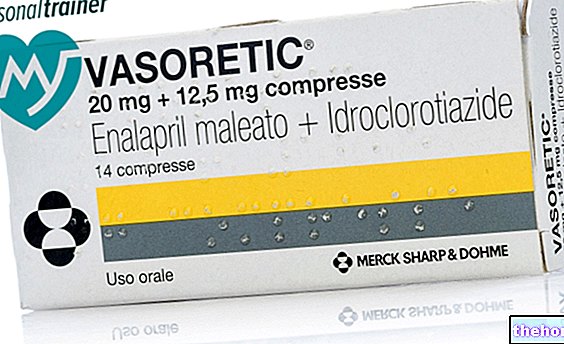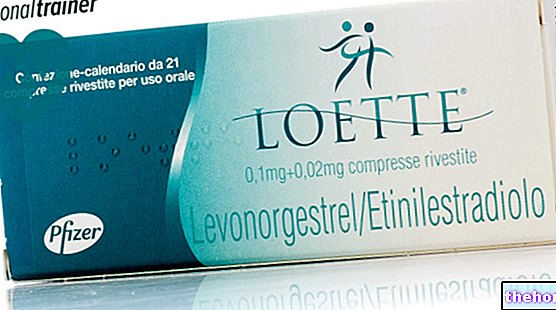Active ingredients: Solifenacin
Vesiker 1 mg / ml oral suspension
Vesiker package inserts are available for pack sizes:- Vesiker 1 mg / ml oral suspension
- Vesiker 5 mg Film-coated tablets
Indications Why is Vesiker used? What is it for?
The active substance in Vesker belongs to the group of anticholinergics. These drugs are used to reduce the activity of the overactive bladder. This delays the need to go to the bathroom and increases the amount of urine that can be contained in your bladder.
Vesker is used to treat the symptoms of an overactive bladder. These symptoms include: sudden and strong urge to urinate with no previous signs, need to urinate frequently or get wet because you can't get to the bathroom in time.
Contraindications When Vesiker should not be used
Do not take Vesiker
- if you have an impediment to urinating or completely emptying your bladder (urinary retention)
- if you have a severe stomach or bowel problem (including toxic megacolon, a complication associated with ulcerative colitis)
- if you have a muscle disease called myasthenia gravis, which causes extreme weakness of some muscles
- if you suffer from increased pressure in the eye, with gradual loss of vision (glaucoma)
- if you are allergic to solifenacin or any of the other ingredients of this medicine (listed in section 6).
- if you are undergoing kidney dialysis
- if you have severe liver disease
- if you have severe kidney disease or mild liver disease and are being treated at the same time with medicines that can reduce the elimination of Vesicer from the body (for example, ketoconazole). Your doctor or pharmacist will inform you about this.
Before starting Vesiker treatment, tell your doctor or pharmacist if you have or have ever had any of the above conditions.
Precautions for use What you need to know before taking Vesker
Talk to your doctor or pharmacist before taking Vesker
- if you experience difficulty in emptying your bladder (= bladder obstruction) or if you have difficulty passing urine (for example, reduced urine flow). The risk of urine accumulation in the bladder (urinary retention) is very high - if you have obstructions of the digestive system (constipation)
- if you have a risk of impaired gastrointestinal motility (gastric and bowel movements). Your doctor will inform you about this possibility
- if you have severe kidney disease
- if you have moderate liver disease
- if you have stomach pain (hiatal hernia) or heartburn
- if you have nervous system disorders (autonomic neuropathy).
Children and adolescents
Vesiker is not for use in children or adolescents under 18 years of age.
Before starting Vesiker treatment, tell your doctor or pharmacist if you have or have ever had any of the above conditions.
Before starting Vesiker treatment, your doctor will check that there are no other causes that lead to the need to urinate frequently (for example heart failure (insufficient ability of the heart to pump blood) or kidney disease). If you have a 'urinary tract infection, your doctor will prescribe an antibiotic (treatment for particular bacterial infections).
Interactions Which drugs or foods can modify the effect of Vesker
Other medicines and Vesker
Tell your doctor or pharmacist if you are taking, have recently taken or might take any other medicines.
It is especially important to tell your doctor if you are taking:
- other anticholinergic drugs, as the efficacy and side effects of both drugs may increase
- cholinergics which may reduce the effectiveness of Vesker
- drugs, such as metoclopramide and cisapride, which stimulate the motility of the gastrointestinal tract, as Vesker can reduce its effectiveness
- medicines, such as ketoconazole, ritonavir, nelfinavir, itraconazole, verapamil and diltiazem which decrease the rate of elimination of Vesker from the body
- drugs, such as rifampicin, phenytoin, carbamazepine which can increase the rate of elimination of Vesker from the body
- medicines such as bisphosphonates which can cause or aggravate inflammation of the throat (esophagitis).
Vesker with food and drink
Vesiker can be taken at your convenience with or without food intake.
Warnings It is important to know that:
Pregnancy and breastfeeding
You should not take Vesiker if you are pregnant unless clearly necessary.
Do not use Vesicer if you are breastfeeding, as solifenacin can be excreted in human milk.
Ask your doctor or pharmacist for advice before taking this medicine.
Driving and using machines
Vesker can cause blurred vision and, rarely, drowsiness and fatigue. Therefore, avoid driving or operating machines if these side effects occur.
Vesker contains lactose. If your doctor has diagnosed you with a rare hereditary problem of galactose intolerance, the Lapp-lactase deficiency or glucose-galactose malabsorption, you should not take this medicine.
Dose, Method and Time of Administration How to use Vesiker: Posology
Instructions for proper use
Always take this medicine exactly as your doctor has told you. If in doubt, consult your doctor or pharmacist.
You must swallow the tablet whole with liquid. He can take it with or without food, as he likes. Do not crush the tablets.
The recommended dose is 5 mg per day, unless your doctor has told you to take 10 mg per day.
Overdose What to do if you have taken too much Vesiker
If you take more Vesker than you should
If you have taken too much Vesiker or if a child has accidentally taken Vesiker, consult a doctor or pharmacist immediately.
Symptoms of overdose may include: headache, dry mouth, dizziness, drowsiness and blurred vision, perception of objects not present (hallucinations), overexcitation, seizures, breathing problems, increased heart rate (tachycardia), accumulation of urine in the bladder (urinary retention) and dilation of the pupils (mydriasis).
If you forget to take Vesiker
If you have forgotten to take a tablet at the usual time, take it as soon as you remember, unless it is time for your next dose. Do not take more than one dose a day. If you are unsure, always consult your doctor or pharmacist .
If you stop taking Vesker
If treatment with Vesicer is stopped, symptoms of bladder overactivity may reappear or worsen. Always consult your doctor if you are considering stopping treatment.
If you have any further questions on the use of this medicine, ask your doctor or pharmacist.
Side Effects What are the side effects of Vesiker
Like all medicines, this medicine can cause side effects, although not everybody gets them.
If you experience an allergic attack or a severe skin reaction (for example blistering and peeling of the skin), you must inform your doctor or pharmacist immediately.
Angioedema (allergic manifestation consisting of swelling of the tissue just below the skin surface) with airway obstruction (difficulty in breathing) has been reported in some patients taking solifenacin succinate (Vesker). In the event of an onset of angioedema, treatment with solifenacin succinate (Vesker) should be discontinued immediately and therapy instituted and / or appropriate measures instituted.
Vesker can cause the following other side effects:
Very common (may affect more than 1 in 10 people)
- Dry mouth
Common (may affect up to 1 in 10 people)
- Blurred vision
- Constipation, nausea, indigestion with symptoms such as bloating, abdominal pain, belching, nausea and heartburn (dyspepsia), stomach discomfort.
Uncommon (may affect up to 1 in 100 people)
- Urinary tract infections, bladder infections
- Drowsiness
- Abnormal perception of taste (dysgeusia)
- Dryness (irritation) of the eye
- Nasal dryness
- Reflux disease (gastroesophageal reflux)
- Dry throat
- Skin dryness
- Difficulty urinating
- Tiredness
- Accumulation of fluid in the lower leg (edema)
Rare (may affect up to 1 in 1000 people)
- Accumulation of large amounts of stool in the large intestine (faecal occlusion)
- Increased amount of urine inside the bladder caused by the inability to empty the bladder (urinary retention)
- Dizziness, headache
- He retched
- Itching, rash
Very rare (may affect up to 1 in 10,000 people)
- Hallucinations, confusion
- Allergic rash
Not known (frequency cannot be estimated from the available data)
- decreased appetite, high levels of potassium in the blood which can cause abnormal heart rhythm
- increased eye pressure
- changes in electrical activity of the heart (ECG), irregular heartbeat, sensation of palpitations, rapid heartbeat
- voice disorders
- liver disorders
- muscle weakness
- kidney disorders
Reporting of side effects
If you get any side effects, talk to your doctor or pharmacist. This includes any possible side effects not listed in this leaflet. You can also report side effects directly via the national reporting system at https://www.aifa.gov.it/content/segnalazioni-reazioni-avverse.
By reporting side effects you can help provide more information on the safety of this medicine.
Expiry and Retention
Keep this medicine out of the sight and reach of children.
Do not use this medicine after the expiry date which is stated on the carton after EXP.
The expiry date refers to the last day of that month.
This medicinal product does not require any special storage precautions. After first opening the bottle, the tablets can be stored for 6 months. Keep the bottle tightly closed.
Composition and pharmaceutical form
What Vesiker contains
- The active ingredient is solifenacin succinate 5 mg or 10 mg.
- The other ingredients are maize starch, lactose monohydrate, hypromellose (E464), magnesium stearate, macrogol, talc, titanium dioxide (E171) and iron oxide (E172).
What Vesiker looks like and contents of the package
Vesiker 5 mg tablets are light yellow, round, marked with the company logo and the number "150" on the same side.
Vesiker 10 mg tablets are light pink round tablets marked with the company logo and the number "151" on the same side.
Vesiker tablets are packaged in blisters of 3, 5, 10, 20, 30, 50, 60, 90, 100 or 200 tablets. Vesiker tablets are also packaged in high density polyethylene bottles with polypropylene cap of 100 tablets.
Not all pack sizes may be marketed.
Source Package Leaflet: AIFA (Italian Medicines Agency). Content published in January 2016. The information present may not be up-to-date.
To have access to the most up-to-date version, it is advisable to access the AIFA (Italian Medicines Agency) website. Disclaimer and useful information.




























